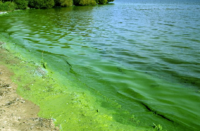Statement by the Communist Party of Ireland – 25 September 2023
The news and the scale of the ecological catastrophe at Lough Neagh are getting worse by the day. These issues did not come to light this month, nor indeed this year. The ecosystem collapse in the lough has long been contributing to the demise and suffering of the communities surrounding it.
Lough Neagh is the source of water for 40 per cent of the population in the Six Counties in the north of Ireland, and the sink for sewage of 40 per cent of the population as well.
Fishing and tourism are other important often-cited industries linked to the largest freshwater lake in Ireland. With the blue-green algal bloom reaching extreme levels, life in and around Lough Neagh is increasingly hard to sustain.
Causes for this catastrophe, which has claimed the lives of animals and seriously threatened the health of the local population, are manifold but related. From climate change, which has already led to a 1°C rise in the water temperature, to an unprecedented amount of sewage from factory farming draining into the lough, the common denominator is the capitalist-driven race for profit that exploits our environmental resources beyond limits and beyond tipping points.
Leaving the bed and banks of Lough Neagh in the hands of an English aristocrat, the Earl of Shaftesbury, illustrates both our imperial exploitative history and the crippling present of private ownership of common resources.
Combined with governmental inaction and vested business interests, private ownership of Lough Neagh stands in the way of its management for the public good.
While the economic, environmental and health crises are always interconnected, the case of Lough Neagh is particularly striking as an example of capitalism’s lethal grip on nature and communities. We call for people’s ownership of Lough Neagh and the management of it in the people’s best interest; conservation of its ecosystem; responsible use of water; and a fundamental change in industrial farming practices.






